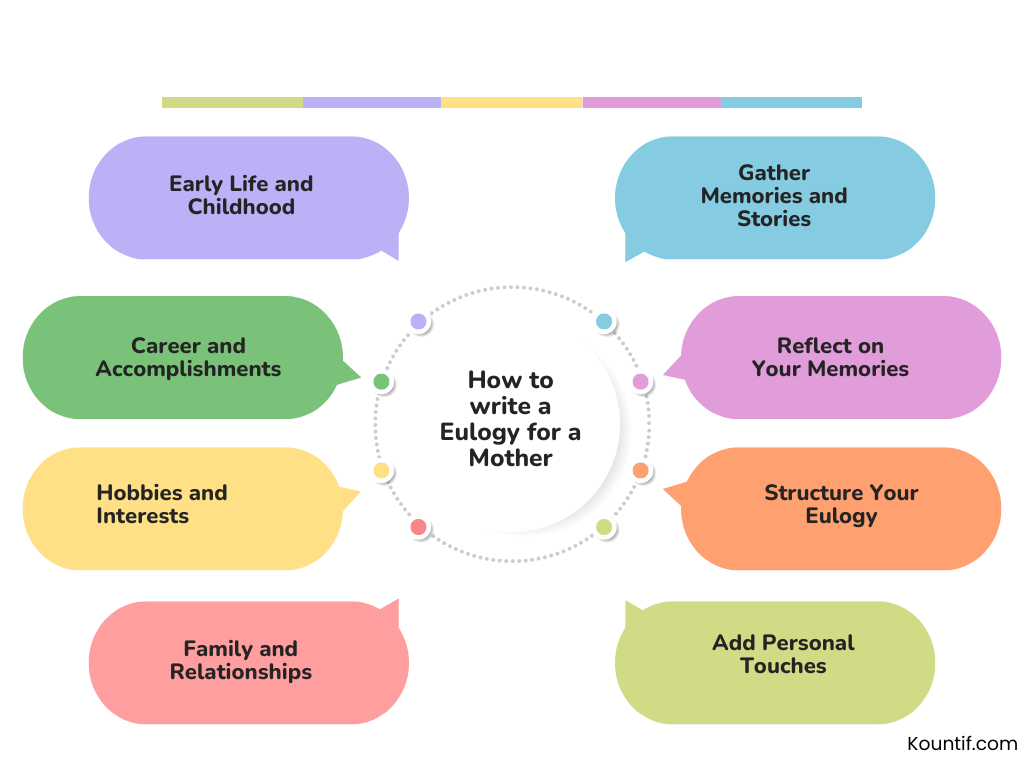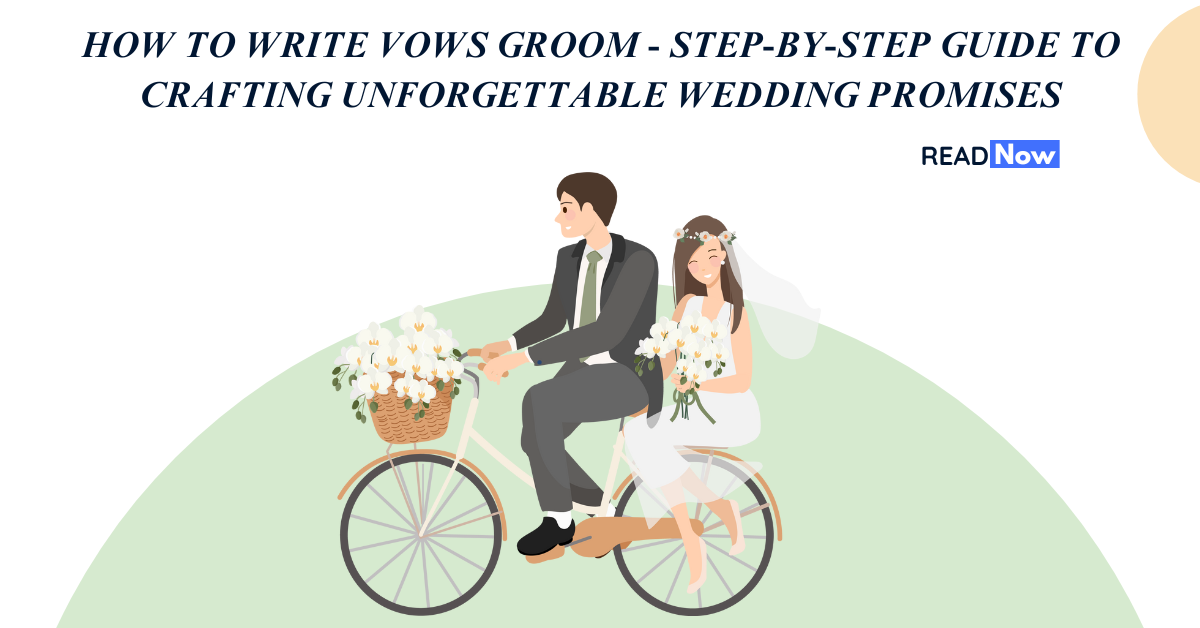![Write Letters for Money [top 13 ways]](https://kountif.com/wp-content/uploads/2024/08/Write-Letters-for-Money-top-13-ways-.jpg)
How to write a Eulogy for a Mother: A Comprehensive Guide
Introduction
A eulogy is a heartfelt tribute that celebrates the life and legacy of a loved one who has passed away. Writing a eulogy for a mother can be an incredibly challenging yet therapeutic experience. It allows you to process your emotions, honor her memory, and share her impact on your life and the lives of others. This guide will explore how to write a eulogy for a mother, providing tips and insights to help you create a meaningful and memorable tribute.
Table of Contents
ToggleRemembering Your Mother’s Life
Early Life and Childhood
The first thing you should do is remember and honor your mother’s early life and childhood. This can include essential events or turning points, like where she was born, her family history, her childhood, her schooling, and any one-of-a-kind experiences that made her who she is today. For instance, you could talk about her school years, the friends she made, and the principles her parents taught her. These stories can give you a clear picture of her childhood, especially if she faced big problems or had exciting experiences that she will never forget.
Career and Accomplishments
Next, talk about your mom’s job and what she has done. Take some time to think about what she has done for you, whether she was a stay-at-home mom who always looked out for her family or had a great job. You can also talk about any prizes, raises, or other special honors she got for her work or community accomplishments. If she helped others or significantly affected her field, these facts can shed more light on her work’s influence.
Hobbies and Interests
You can also respect your mother’s memory by discussing what she liked to do. Did she love cooking, gardening, or making things? Did she love to read, travel, or help people? You can learn more about your mother’s attitude and what made her happy by looking at these details. For instance, you could talk about her best foods, the places she wanted to visit, or the charity work she was most proud of. By telling these things about her life, we can celebrate how unique she is and how much she loves living.
Family and Relationships
Your mom was a person, a daughter, a sister, a wife, a friend, and most of all, a loving mom. Think about the relationships she had with her family and friends. Please talk about the good times you had with her and how she affected the people around her. Talk about how she cared for and supported her family and friends, the practices she loved, and how she showed her love and support. These thoughts help show how warm and deep her relationships with the people she cared about were.
Gather Memories and Stories
Getting memories and stories from people who knew your mother is the best way to make a great eulogy. Talk to her family, friends, coworkers, and anyone you think might have known her well. Be bold and talk to people who know her from different times; they might have new ideas. Ask them to tell you their best stories or memories of your mother that you can use in your eulogy. You might be shocked by the stories and insights that come up. They can help you get a better sense of who she was and how she affected other people.
Reflect on Your Memories
Along with getting stories from other people, take some time to think about your memories of your mother. Take some time to think about your good times with her, what she taught you, and how she changed your life. What memories do you enjoy? What changed about your life because of her? It would help to write down any events or qualities that stand out to you. Adding these personal stories and thoughts to your eulogy will make it more meaningful and accurate, giving people a moving tribute that hits home.
Structure Your Eulogy
There is no right or wrong way to put together your eulogy. Some people like to write about her life in order, starting with her early years and ending. Others want to organize their thoughts into themes or groups, like her kindness, sense of humor, or accomplishments. It would help if you thought about what format works best for you and lets you tell your mother’s story in a way that honors her life. You could start with an opening that shows who she is, then have a few critical parts with memories and stories, and end with a touching closing.
Add Personal Touches
You could add pictures, quotes, or other emotional things to your eulogy to make it even more personal. These can be vital signs of your love and bond with your mom and help your words come to life. You could include a favorite family picture, a meaningful quote from one of her favorite books, or something significant to her, like a letter she wrote or a piece of jewelry. These personal touches can make people feel solid feelings and connect with you more deeply, creating your ode to your mother truly unique and remembered.
Learn also how to write a eulogy and its conclusion of eulogy.
Tips for writing eulogy for a Mother
When writing a eulogy for a mother, keep these tips in mind to help you craft a meaningful tribute that honors her life and legacy:
- Be sincere and genuine. Speak from the heart and share personal stories and memories that capture the essence of your relationship with your mother. This authenticity will resonate with those in attendance.
- Use descriptive language to paint a vivid picture of who your mother was as a person. Describe her personality, her passions, and the little quirks that made her unique. This helps create a more complete and relatable image of her.
- Incorporate humor if appropriate, but balance it with moments of tenderness and reflection. Light-hearted anecdotes can bring smiles and ease sorrow but highlight the depth of her character and the meaningful moments you shared.
- Share specific examples of how she impacted your life and the lives of others. Mention particular instances where her actions, advice, or love made a significant difference. These stories can illustrate her kindness, strength, and the legacy she leaves behind.
- Please keep the tone respectful and uplifting, focusing on celebrating her life rather than mourning her passing. Emphasize her achievements, her strengths, and the positive influence she had on those around her.
- Practice delivering the eulogy beforehand to ensure you are comfortable speaking in front of others. This preparation can help you manage your emotions and deliver your tribute smoothly, allowing you to honor your mother with confidence and poise.
Do and Don’t for writing eulogy for a Mother
When writing a eulogy for a mother, it can be helpful to keep in mind some do’s and don’ts to ensure your tribute is respectful and meaningful:
Do:
- Speak from the heart and share personal stories and memories.
- Use descriptive language to paint a vivid picture of who your mother was as a person.
- Incorporate humor if appropriate, but balance it with moments of tenderness and reflection.
- Share specific examples of how she impacted your life and the lives of others.
- Please keep the tone respectful and uplifting, focusing on celebrating her life.
Don’t:
- Avoid using cliches or generic phrases. Make sure your words are genuine and heartfelt.
- Don’t shy away from sharing difficult emotions or moments. Vulnerability and honesty can make your tribute even more powerful.
- Try not to focus solely on her passing. While it is a significant event, your eulogy should primarily celebrate her life and legacy.
- Don’t feel pressured to include details or stories that aren’t authentic to your relationship with your mother. Focus on what feels genuine and meaningful to you. Overall, remember to stay true to yourself.
Overview
| Topic | Key Points | Tips |
|---|---|---|
| Remembering Your Mother's Life | Early life, childhood, career, hobbies, relationships | Be sincere, use descriptive language, incorporate humor |
| Gathering Memories and Stories | Talk to family, friends, coworkers, and others who knew her | Ask open-ended questions, listen actively, take notes |
| Structuring Your Eulogy | Chronological, thematic, or hybrid approach | Start with an opening, use transitions, end with a closing |
| Adding Personal Touches | Photos, quotes, mementos, stories | Choose items that resonate with your mother's personality and legacy |
| Do's and Don'ts | Speak from the heart, use descriptive language, focus on celebrating her life | Avoid clichés, generic phrases, and focusing solely on her passing |
| Tips for Writing a Eulogy | Be genuine, use humor, share specific examples, practice beforehand | Take your time, be patient, and seek support if needed |
Conclusion
Writing a eulogy for a mother can be a challenging but rewarding experience. Following the tips and guidelines outlined in this article, you can create a meaningful and memorable tribute that honors her life and legacy. Remember to speak from the heart, share personal stories and memories, and use descriptive language to paint a vivid picture of who your mother was as a person. Don’t be afraid to incorporate humor and vulnerability; focus on celebrating her life rather than mourning her passing.
FAQs
Q: How do I start writing a eulogy for my mother?
A: Start by brainstorming memories and stories about your mother’s life, personality, and accomplishments. Consider her early life, career, hobbies, and relationships.
Q: What tone should I use when writing a eulogy for my mother?
A: Keep the tone respectful and uplifting, focusing on celebrating her life rather than mourning her passing.
Q: How long should a eulogy for my mother be?
A: Aim for around 3-5 minutes, depending on the specific circumstances and the audience.
Q: Can I include personal touches like photos or quotes in my eulogy for my mother?
A: Yes, including personal touches can make your eulogy more meaningful and memorable. Consider adding photos, quotes, or other mementos that capture your mother’s spirit and personality.





![How to Write Acknowledgments for a Book [Complete Guide]](https://kountif.com/wp-content/uploads/2024/08/How-to-Write-Acknowledgments-for-a-Book-1-1.png)